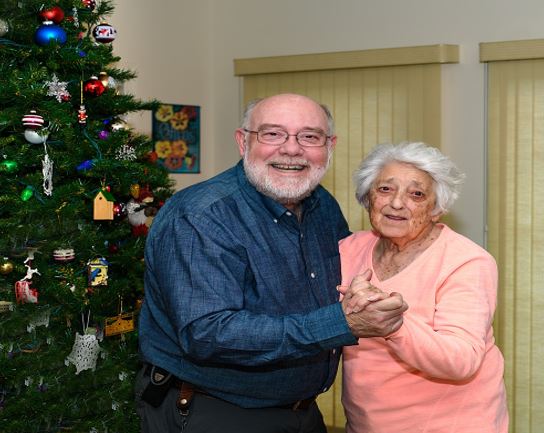Sometimes, the truth can cause sufferers to grieve anew.
WHEN A LOVED ONE ASKS, “Where’s Ma?” as my father often did, referring to my mother, I’d hesitatingly reply, “Well, uh, you know she died three years ago.”
He’d look at me, shocked, then lower his head and retreat to his bedroom in our home. Each time my husband and I reminded him of her passing, he’d grieve. He and my mother were married for 43 years after he, a long-time bachelor, married at age 40.
Dementia symptoms at age 86 made it difficult for him to remember. It became clear he could no longer live alone safely. Limited by our options, my husband and I moved him from his Wisconsin home of 45 years into our California home.
Nothing but the Truth?
We were raised to tell the truth. I was born on my father’s 49th birthday. I can’t lie to him! If he had a lucid moment, he’d know I lied. How do you rebuilt trust after breaking it? So, I insisted on telling the truth each time. As a result, he grieved anew each time he learned that his wife had died.
During the support group, I asked for advice: How do I answer my father when he asks about my mother’s whereabouts?
A nurse with a dry sense of humor who left her job to care for her mother at home told me: lie. I thought she was kidding until the other members agreed.
“What?” Support group had always made sense, but this was downright unethical! Tempering my righteous indignation, I blurted out, “That’s not a good idea! Seriously, how do I respond to potentially emotionally-charged questions?”
That afternoon, I didn’t hear the rest of their advice. I went home and mulled over what I had taken in. I couldn’t erase the hypocritical-sounding advice that came from the mouths of these principled support-group members.
Therapeutic Lying
In the weeks following the support-group members’ advice, I learned about therapeutic lying. There are variations when using this approach from telling an innocent lie to diverting attention toward a pleasant memory.
Instead of “Don’t you remember, she died a half-dozen years ago?” I’d say, “She went to the store. She said she wanted to make us a special meal.”
“Oh,” he’d often respond. But the “special meal” lie elicited a smile or an “Oh really? What’s the occasion?”
Although, this kind of lying is for his own good, I still felt uneasy. So, I used another technique in the therapeutic lying arsenal. I diverted his attention with a fun memory. “Remember when you’d cultivate the garden each spring and Ma would plant the seeds she’d saved from last year’s harvest?”
My father would look at me, inquisitively.
I’d add another memory, “Remember when Ma would go through a lot of trouble to prepare breakfast and we’d have a Sunday morning picnic at Bradford Beach? Remember the stone lions?”
He’d smile brightly and ask, “You remember all that?”
He felt much better after those diversionary memories, and so did I. I learned about the enormous difference in telling the (harsh) truth of life versus telling a truth that helps one recall pleasant memories. Caregiving became less of a struggle.
Lying and Dementia
Depending on the type and stage of dementia, the original question may be quickly forgotten, leaving pleasing emotions to linger. If our loved ones choose to come along on our diversionary trips down memory lane, instead of grieving a loved one’s passing as my father did each time, they’ll be filled with joyful feelings and warm memories.
Brain cells are dying as the person with dementia struggles to remember. Like the holes in Swiss cheese, gaps cloud one’s memory. To survive, our brains attempt to fill in those holes. Sometimes, when we can’t tell the difference between reality and fantasy, we hallucinate, which people with dementia are inclined to do. See the example in the first caregiver tip.
While living with us, my father occasionally surprised me with, “Be quiet. She’s sleeping.”
“Who’s sleeping?” I’d ask.
“Ma,” he’d reply. “When I got up this morning, she didn’t budge, so I covered her and quietly closed the door so she can rest.”
“Oh,” I’d play along. “We know how hard she works. OK, we’ll talk softly.”
Such an exchange affirms his view of the world. He feels his message is understood. This is especially important for people with dementia. It is frustrating to not be able to get one’s meaning across. As the disease progresses, aphasia, or language impairment, makes communicating one’s ideas increasingly difficult.
World-renowned for her breakthrough Validation Therapy, Naomi Feil, advises that to better empathize and communicate with cognitively impaired people suffering from dementia, that we enter their reality. This four-minute You-Tube video overviews the approach. There is no harm in believing the sky is orange. Sometimes, when the sun is rising or setting and the clouds are just right, it does have hues of orange.
The benefits of therapeutic lying with validation allow the person with dementia to maintain dignity and elicit a continued sense of purpose and the desire to communicate for as long as possible.
As the years have passed, I have begun advocating for therapeutic lying and sometimes even find myself giving the one-word response the dry-humored nurse once gave me: Lie.
By: Brenda Avadian
Source: https://health.usnews.com/health-news/patient-advice/articles/2016-04-15/therapeutic-lying-to-comfort-loved-ones-with-dementia

